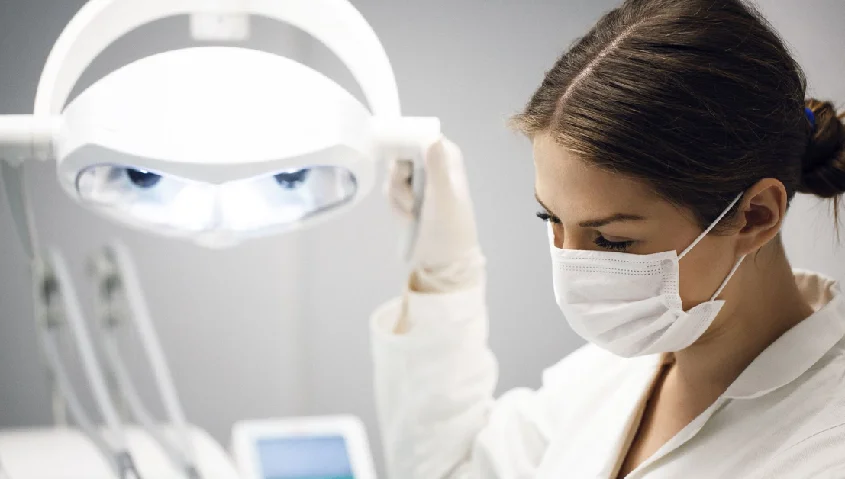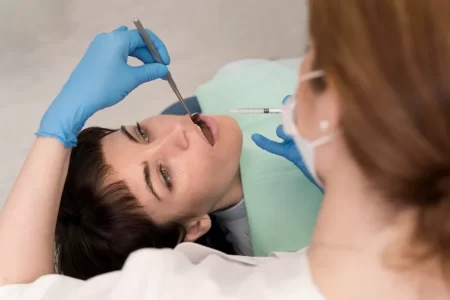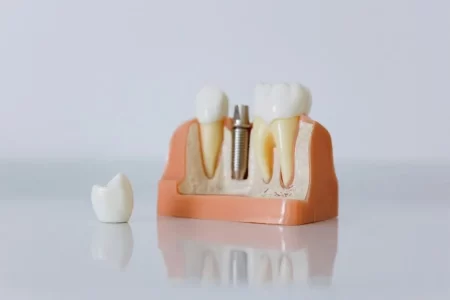Why Your Dentist Recommends No Dairy After Tooth Extraction
- Updated on: Feb 29, 2024
- 6 min Read
- Published on Jun 29, 2023

Tooth extraction is a common dental procedure that involves removing a tooth from its socket in the jawbone. There are several reasons why your dentist may recommend tooth extraction, including severe tooth decay, infection, and overcrowding of teeth. While tooth extraction is a relatively simple and safe procedure, it is important to follow proper aftercare instructions to ensure a smooth recovery and prevent complications.
Role of Diet in Tooth Extraction Recovery
Diet plays a crucial role in tooth extraction recovery, as certain foods can help promote healing and prevent infection. After tooth extraction, it is recommended to stick to a soft and bland diet for the first few days, gradually reintroducing solid foods as your mouth heals. It is also important to avoid certain foods and drinks that can irritate the extraction site and delay healing.
Preview of the Article’s Main Focus on Dairy and its Impact on Tooth Extraction Healing
While many foods and drinks are recommended to promote healing after a tooth extraction, dairy is often not one of them. In fact, some dentists may recommend avoiding dairy altogether during the recovery period. In the next section of this article, we will explore the relationship between dairy and tooth extraction healing, and why your dentist may recommend steering clear of dairy products for a few days after your extraction.
Overall, understanding the role of diet in tooth extraction recovery is important for ensuring a speedy and complication-free recovery. By exploring the impact of dairy on tooth extraction healing, we can help readers make informed decisions about their diet and recovery plan.
The Connection Between Dairy and Tooth Extraction
Dairy products such as milk, cheese, and yogurt contain high amounts of calcium, which is essential for strong bones and teeth. However, after tooth extraction, the properties of dairy can have a negative impact on the healing process. The extraction site is a wound that needs to form a blood clot in order to heal properly. Dairy can interfere with the clotting process by thinning the blood and preventing the clot from forming.
In addition, dairy can also be acidic, which can irritate the extraction site and delay the healing process. The calcium in dairy can also bind to other minerals in the body, such as iron and zinc, which are necessary for wound healing. This can result in a deficiency of these important nutrients, which can further slow down the healing process.
How Dairy Can Interfere with Blood Clot Formation and Healing
After a tooth extraction, a blood clot forms at the extraction site. This clot is necessary for healing and protecting the underlying bone and nerve endings. However, consuming dairy products after the extraction can interfere with the blood clotting process.
Dairy contains a protein called casein, which can cause the blood to become thicker and less able to clot. This can lead to the formation of a weak or incomplete clot, which can increase the risk of complications such as dry socket or infection.
Furthermore, the calcium in dairy can also affect the way the blood clot forms. Calcium is essential for blood clotting, but too much calcium can lead to abnormal clotting and impede the formation of a proper clot at the extraction site.
Dairy products can contain a variety of bacteria, some of which can be harmful to oral health. After a tooth extraction, the extraction site is vulnerable to infection, and consuming dairy can increase the risk of introducing harmful bacteria to the site.
For example, Streptococcus mutans is a bacteria commonly found in dairy products such as milk and cheese. This bacteria is also a major contributor to tooth decay and can lead to infections at the extraction site. Other bacteria commonly found in dairy products, such as Listeria monocytogenes and Salmonella, can also cause serious infections.
Why Dairy Should Be Avoided After Tooth Extraction
After a tooth extraction procedure, it is important to avoid certain foods, and dairy products are one of them. Dairy products are known to provide several health benefits, but when it comes to post-operative recovery, they can have adverse effects on the healing process. In this section, we will discuss why dairy should be avoided after tooth extraction.
Increased risk of infection
Dairy products are a source of protein, but they also contain high levels of bacteria. The bacteria found in dairy products can increase the risk of infection after a tooth extraction. The extraction site is an open wound, and introducing bacteria into the wound can cause inflammation and infection, which can delay the healing process. Therefore, it is best to avoid dairy products for a few days after the procedure to reduce the risk of infection.
Prolonged bleeding
Dairy products contain calcium, which is known to promote blood clotting. However, after a tooth extraction, the clotting process is essential for proper healing. Calcium in dairy products can interfere with the clotting process, leading to prolonged bleeding from the extraction site. This can be uncomfortable for the patient and may also prolong the healing process. Therefore, it is best to avoid dairy products for a few days after the procedure to reduce the risk of prolonged bleeding.
Delayed healing process
The healing process after a tooth extraction can take some time, and proper post-operative care is essential for a speedy recovery. However, consuming dairy products can delay the healing process. As mentioned earlier, dairy products can increase the risk of infection and interfere with the clotting process, which can lead to a delayed healing process. Therefore, it is best to avoid dairy products for a few days after the procedure to allow for proper healing.
Alternative Foods to Consume After Tooth Extraction
After a tooth extraction procedure, it’s crucial to maintain a healthy diet to ensure a speedy recovery. However, certain foods should be avoided, particularly dairy products, due to their impact on inflammation, clotting, and bone regeneration. Instead, consider incorporating the following alternative foods into your diet:
Protein-rich foods
Protein is essential for wound healing and tissue regeneration. After a tooth extraction, it’s important to consume protein-rich foods to promote tissue repair and regeneration. Some of the best sources of protein include:
- Lean meats, such as chicken, turkey, and fish
- Eggs
- Legumes, such as lentils, chickpeas, and beans
- Nuts and seeds, such as almonds, chia seeds, and pumpkin seeds
- Tofu and other soy-based products
Vitamin-rich foods
Vitamins are essential for maintaining overall health and promoting healing after surgery. After a tooth extraction, it’s important to consume foods that are rich in vitamins A, C, and K. These vitamins are crucial for supporting the immune system, reducing inflammation, and promoting blood clotting. Some of the best sources of vitamins include:
- Vitamin A: Carrots, sweet potatoes, spinach, and liver
- Vitamin C: Citrus fruits, berries, kiwis, tomatoes, and broccoli
- Vitamin K: Leafy green vegetables, such as kale, spinach, and collard greens
Anti-inflammatory foods
Inflammation is a natural response to injury or surgery, but excessive inflammation can slow down the healing process. To reduce inflammation and promote healing, it’s important to consume foods that are rich in anti-inflammatory compounds, such as:
- Omega-3 fatty acids: Fatty fish, such as salmon and mackerel, as well as chia seeds, flaxseeds, and walnuts
- Turmeric: This spice has anti-inflammatory properties and can be added to smoothies, soups, and other dishes
- Ginger: Ginger has anti-inflammatory properties and can be consumed in teas, smoothies, or added to dishes
Tips for Post-Operative Recovery
Proper Oral Hygiene
After a tooth extraction, it is important to maintain proper oral hygiene to avoid any infections or complications. Here are some tips to follow:
- Gently rinse your mouth with warm saltwater several times a day to keep the wound clean.
- Brush your teeth twice a day, being careful not to brush the extraction site.
- Avoid using mouthwash or any other oral hygiene products without consulting your dentist.
- Do not use a straw for the first few days after the procedure, as the sucking motion can dislodge the blood clot and delay the healing process.
Avoiding Strenuous Activities
To promote healing and reduce the risk of complications, it is important to avoid any strenuous activities that may put undue stress on the body. Here are some tips to follow:
- Avoid any strenuous exercise or physical activity for at least 24 hours after the procedure.
- Do not lift heavy objects or engage in any activity that requires bending or straining.
- Avoid any activities that may increase blood pressure or cause you to strain, such as sneezing or coughing.
- Follow your dentist’s instructions regarding when you can resume normal activities.
Importance of Rest and Relaxation
After tooth extraction, your body needs time to heal and recover. Rest and relaxation are essential during this time. Here are some tips to follow:
- Get plenty of rest and avoid strenuous activity for the first few days after the procedure.
- Avoid any activities that may cause stress or anxiety, such as work or school.
- Take time to relax and unwind, whether it’s by reading a book, watching TV, or taking a warm bath.
- Eat a healthy diet and stay hydrated to promote healing and maintain your energy levels.
By following these tips, you can help ensure a healthy and speedy recovery after a tooth extraction. Remember to consult with your dentist for specific post-operative care instructions tailored to your individual needs.











